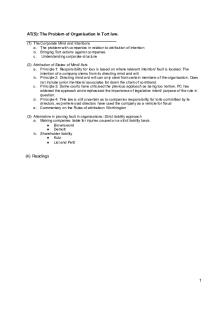The tort of deceit - Commercial Law PDF

| Title | The tort of deceit - Commercial Law |
|---|---|
| Course | Commercial Law |
| Institution | University of Chester |
| Pages | 2 |
| File Size | 40.1 KB |
| File Type | |
| Total Downloads | 55 |
| Total Views | 171 |
Summary
This document provides: The tort of deceit, and Negligent misstatement...
Description
The tort of deceit
It is well established that an agent can be liable to a third party if he engages in the tort of deceit. The classic definition of this tort was provided by Lord Herschell, who stated that:
in order to sustain an action in deceit, there must be proof of fraud, and nothing short of that will suffice … [F]raud is proved when it is shown that a false representation has been made, (1) knowingly, or (2) without belief in its truth, or (3) recklessly careless whether it be true or false.
It is also important to note that the principal’s knowledge or recklessness will not be projected onto the agent.
Negligent misstatement
The leading case on negligent misstatement, namely Hedley Byrne & Co Ltd v Heller & Partners Ltd, established that in order for negligent misstatement to arise, a duty of care needed to exist. Lord Morris stated that ‘if someone possessed of a special skill undertakes, quite irrespective of contract, to apply that skill for the assistance of another person who relies upon such skill, a duty of care will arise’.
It follows that an agent will only be liable if he owed a duty of care to the third party and, as Lord Morris’s statement indicates and as future courts have made clear, this will depend upon whether the agent has assumed a responsibility towards the third party.
As the courts will have regard to all the circumstances of the case, it follows that determining and predicting whether or not an agent has assumed a responsibility towards a third party is not always an easy task....
Similar Free PDFs

Outline of tort law
- 4 Pages

Law of Tort exam
- 6 Pages

Commercial Law of Agency
- 16 Pages

Revision - Tort - Tort Law
- 32 Pages

Law of Tort 8.04.29 PM
- 46 Pages

Breach of Duty - tort law
- 4 Pages

TORT LAW Revision - Summary Tort Law
- 25 Pages

The Tort of Nuisance
- 6 Pages
Popular Institutions
- Tinajero National High School - Annex
- Politeknik Caltex Riau
- Yokohama City University
- SGT University
- University of Al-Qadisiyah
- Divine Word College of Vigan
- Techniek College Rotterdam
- Universidade de Santiago
- Universiti Teknologi MARA Cawangan Johor Kampus Pasir Gudang
- Poltekkes Kemenkes Yogyakarta
- Baguio City National High School
- Colegio san marcos
- preparatoria uno
- Centro de Bachillerato Tecnológico Industrial y de Servicios No. 107
- Dalian Maritime University
- Quang Trung Secondary School
- Colegio Tecnológico en Informática
- Corporación Regional de Educación Superior
- Grupo CEDVA
- Dar Al Uloom University
- Centro de Estudios Preuniversitarios de la Universidad Nacional de Ingeniería
- 上智大学
- Aakash International School, Nuna Majara
- San Felipe Neri Catholic School
- Kang Chiao International School - New Taipei City
- Misamis Occidental National High School
- Institución Educativa Escuela Normal Juan Ladrilleros
- Kolehiyo ng Pantukan
- Batanes State College
- Instituto Continental
- Sekolah Menengah Kejuruan Kesehatan Kaltara (Tarakan)
- Colegio de La Inmaculada Concepcion - Cebu







